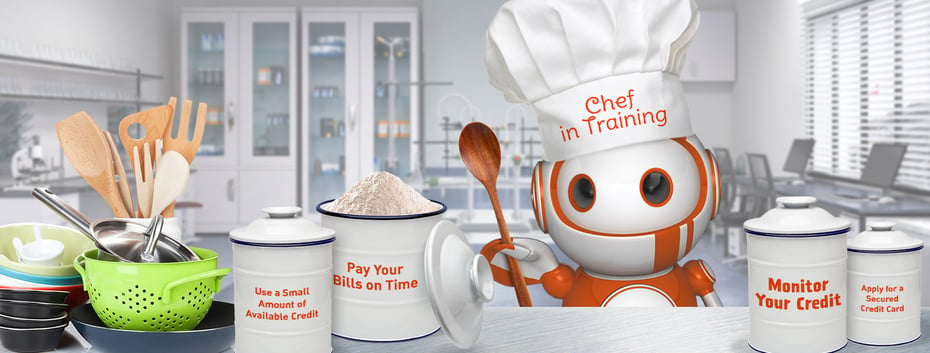
Gathering ingredients for a smart money management soufflé hasn't been easy. While you've secured a steady paycheck, opened a NextGen Checking Account, and whipped up a small savings cushion, you're still missing one key ingredient that could make your recipe fall flat - good credit. Without it, achieving your financial dreams might be tricky.
Individuals with little or no credit often fork over more money in housing and utility deposits. Everyday purchases, like wireless services, may also burn a hole in your wallet when you have to pay up-front for devices or data.
Crack open these tips to help build good credit from scratch.
Pay All of Your Bills on Time
Not only is on-time bill payment a sign of adulting, but it's also a sure-fire way to influence 35% of your FICO® Score. Creditors typically report your payment history to at least one of the major credit reporting bureaus: Experian, Equifax, and TransUnion. Even if you don't have a credit card or loan, you can still benefit from on-time bill payments. Each time you use your NextGen Checking Account to pay your electric bill, wireless provider, or streaming account on time, it could help build your credit report. Experian Boost™ allows you to attach that payment history to your credit file.
Apply for a Secured Credit Card
One of the fastest ways to add to your credit history report is to make payments on a secured credit card, like the Logix Savings Secured MasterCard. Most secured credit cards look just like traditional credit cards. However, unlike traditional cards, secured cards require collateral in the form of a deposit to secure the loan. Funds are typically placed in a restricted savings account. A secured credit card is accepted at the same places other credit cards are accepted. Retailers won't know whether the card you are using is a secured card or a traditional credit card. The financial institution that issues the card may also report to at least one of the major credit reporting bureaus.
Use a Small Amount of Available Credit
Once you have credit, you might be tempted to use it. All of it. But that's often a fast way to tank your credit score just when you're getting started. Credit scoring models look at your credit utilization, which is the total credit compared to the amount you have available, to assess how well you're managing the credit you already have. When you are at or near your credit limit, you're viewed as a high credit risk. So keep credit utilization below 30% to build good credit.
Monitor Your Credit
Just like you wouldn't leave a dish in the oven without monitoring it, you can't set and forget your credit file. As long as you're paying bills, you have the potential for that activity to appear on your credit report. For example, if you become delinquent on your cell phone bill and it's sent to collections, that activity can be reported to the credit bureaus.
Don't wait until you have a relationship with the creditor before checking your credit report for the first time. Visit AnnualCreditReport.com and request a free copy of your credit history reports from each of the three major credit reporting bureaus. Review them for accuracy. If information appears on the report that doesn't belong to you, file a dispute with the credit bureau. Incorrect information on your report can lower your credit score and affect your future.
Adding the right mixture of credit behaviors could help you build good credit quickly. Eventually, maintaining a solid credit profile will be as simple as following a basic recipe.
------------------------------
*Logix Federal Credit Union is not affiliated with any outside sources, and is a separate entity. Please contact Logix at (800) 328-5328 or visit www.lfcu.com if you have any questions about this topic or would like to consider opening an account.


%20(1200%20x%20628%20px)%20(952%20x%20317%20px)-1.png)
%20(2)-1.png)
.png)




%20(952%20x%20317%20px)-2.png)

